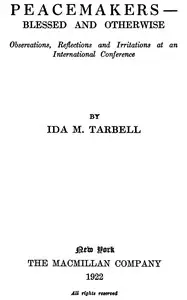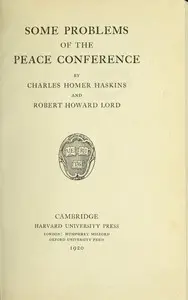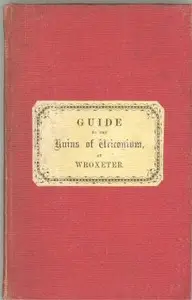"The Peace Negotiations: A Personal Narrative" by Robert Lansing is a recollection of the past centered around the events that took place after World War I and the Treaty of Versailles. Told from the point of view of the Secretary of State, the story gives a first hand look into the intricacies of the peace talks and the disagreements the author had with President Woodrow Wilson concerning the League of Nations and the bigger peace deal. The text introduces Lansing's reasons for writing down his own experiences during the Paris Peace Conference. He remembers the growing disagreements between himself and President Wilson as things played out, explaining their relationship and what choices led to his quitting his job. Lansing wants to clear up the different opinions that existed, especially on important topics like the League of Nations and land guarantees.

The Peace Negotiations: A Personal Narrative
By Robert Lansing
Go back to the aftermath of a world war as a former Secretary of State exposes the heated conflicts and disagreements that unfolded during crucial peace talks.
Summary
About the AuthorRobert Lansing was an American lawyer and diplomat who served as Counselor to the State Department at the outbreak of World War I, and then as United States Secretary of State under President Woodrow Wilson from 1915 to 1920. A conservative pro-business Democrat, he was a strong advocate of democracy and of the United States' role in establishing international law. He was an avowed enemy of German autocracy and Russian Bolshevism. Before U.S. involvement in the war, Lansing vigorously advocated freedom of the seas and the rights of neutral nations. He later advocated U.S. participation in World War I, negotiated the Lansing–Ishii Agreement with Japan in 1917 and was a member of the American Commission to Negotiate Peace at Paris in 1919. However, Wilson made Colonel House his chief foreign policy advisor because Lansing privately opposed much of the Treaty of Versailles and was skeptical of the Wilsonian principle of self-determination.
Robert Lansing was an American lawyer and diplomat who served as Counselor to the State Department at the outbreak of World War I, and then as United States Secretary of State under President Woodrow Wilson from 1915 to 1920. A conservative pro-business Democrat, he was a strong advocate of democracy and of the United States' role in establishing international law. He was an avowed enemy of German autocracy and Russian Bolshevism. Before U.S. involvement in the war, Lansing vigorously advocated freedom of the seas and the rights of neutral nations. He later advocated U.S. participation in World War I, negotiated the Lansing–Ishii Agreement with Japan in 1917 and was a member of the American Commission to Negotiate Peace at Paris in 1919. However, Wilson made Colonel House his chief foreign policy advisor because Lansing privately opposed much of the Treaty of Versailles and was skeptical of the Wilsonian principle of self-determination.














